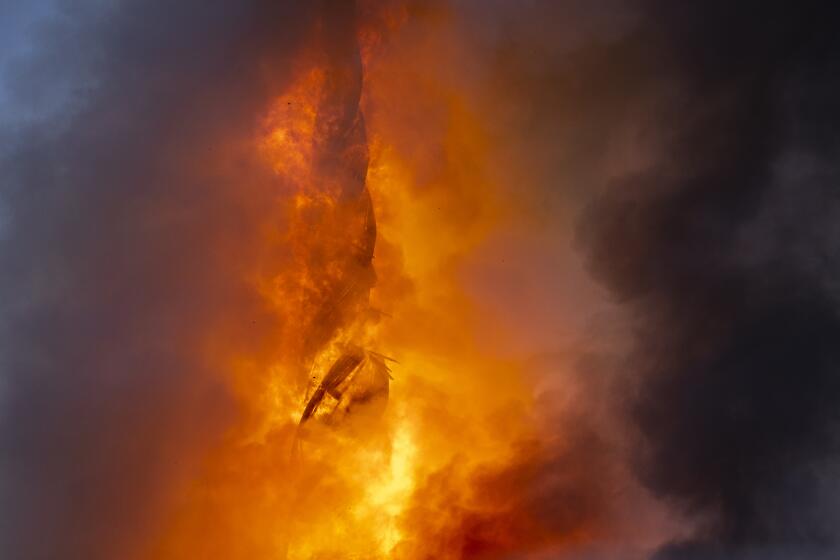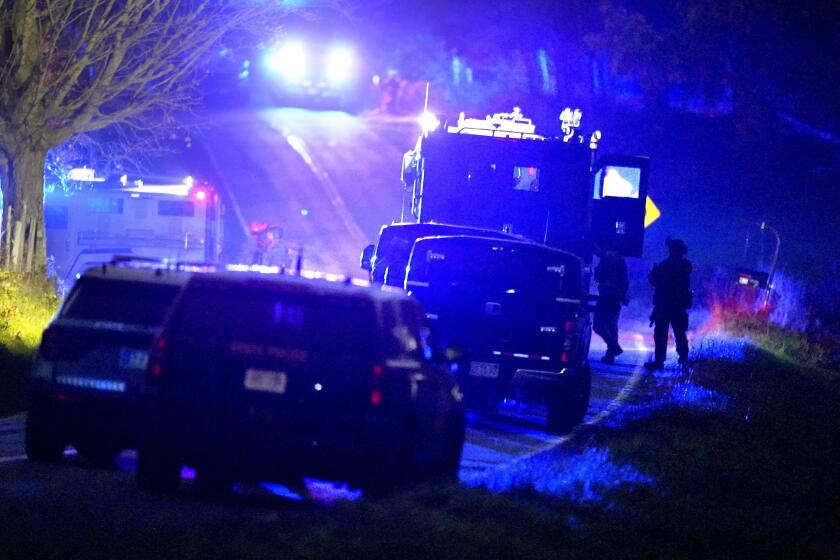Bush’s Goals in Austria May Be Overshadowed
President Bush stepped off Air Force One on a warm night Tuesday in the heart of Central Europe, and into the steamy debate over the U.S. war in Iraq and his administration’s tactics in countering terrorism.
He began a 21-hour visit to Austria, built around a meeting with the leaders of the European Union, as the United States and its allies await Iran’s response to their latest anti-nuclear proposals. Bush also plans a similar quick stop in Hungary tonight and Thursday.
The president arrived with what his national security advisor, Stephen Hadley, said last week were three goals: “Promoting freedom and democracy, enhancing security and pursuing greater global prosperity.” The goals draw little debate, but the means for achieving them are tearing at the European political and social fabric.
Though the U.S. agenda with Europe covers global trade negotiations, European farm subsidies and Iran, Austrians want their leaders to confront Bush’s policies in Iraq, the U.S. prison at Guantanamo Bay, Cuba, and the “rendition” of suspected terrorists to countries that permit torture. Newspapers and TV talk shows have discussed little else in recent days, with people at both ends of the political spectrum denouncing the treatment of terrorism suspects who have not been charged with crimes.
The visit to this officially neutral country is the first by a U.S. president since Jimmy Carter met Soviet leader Leonid I. Brezhnev here in 1979 to sign an arms control treaty. Bush is meeting with Chancellor Wolfgang Schuessel, EU president.
Peter Pilz, a spokesman on security issues for the leftist Green Party, said of Bush’s visit: “It is problematic to welcome as guest a politician who wages unconstitutional wars, uses falsified secret ... reports as an excuse to do so, is willing to preemptively deploy nuclear weapons, who tolerates kidnappings, torture and illegal detention camps as a means of security policy.”
Joerg Haider, former leader of the far-right Freedom Party, said in an interview with the moderately conservative newspaper Die Presse that Bush was turning the Middle East “into a witches’ caldron.”
“The summit will not change anything,” said Haider, who is best-known for anti-Semitic comments and opposition to immigrants when his party was part of the government.
Austria’s widely read news magazine Profil featured Bush on its cover this week, under the headline “The Mad World of George Bush.”
“What makes the leader of the last superpower tick? Just how fanatical is he?” the magazine asked. In the city of Freud, it drew a deeply unflattering psychological profile of the president, under the headline “Bush on the Couch.”
The visit to Budapest, the Hungarian capital, will give Bush an opportunity to commemorate the unsuccessful partisan uprising against Soviet domination in 1956. The revolution foreshadowed the disintegration more than three decades later of communist rule across Central and Eastern Europe, and provides the U.S. leader a metaphor for the broader democracy that he has promoted as the foundation of his Middle East policies.
Noting the division in Europe over the war, Bush said Monday at the U.S. Merchant Marine Academy in Kings Point, N.Y., “Some of the most important support for Iraqis is coming from European democracies with recent memories of tyranny.” He cited Poland, Hungary, Romania, Bulgaria, the Czech Republic, Slovakia, Georgia, Ukraine, Latvia, Lithuania and Estonia as examples.
But he acknowledged that “others in Europe have had disagreements with our decisions on Iraq.”
Bush is making a renewed push to get those who have promised to help rebuild Iraq to begin paying up. Of the $13.5 billion in assistance that has been pledged, he said Monday, only $3.5 billion has been paid.
Large amounts are due from Iraq’s wealthier Persian Gulf neighbors, but Europe also owes money, Hadley said last week.
The meeting with the EU leadership has been long-scheduled, but its timing allows the president to promote a united front in the effort to pressure Iran to suspend enrichment of nuclear fuel, which the Bush administration sees as an immediate and pressing problem.
The five permanent members of the United Nations Security Council -- the U.S., Russia, China, France and Britain -- and Germany offered a package of incentives early this month to persuade Iran to halt its nuclear program. Since then, Iran has been lobbying hard to soften the terms so it can continue some uranium enrichment as “research and development.”
Iranian President Mahmoud Ahmadinejad said Friday that the offer was under serious consideration.
In the view of some analysts in Washington, the diplomatic strategy on Iran may allow the U.S. to present a less bellicose image than it has regarding Iraq, potentially softening the impression Bush creates.
Having recently agreed to join other nations in direct negotiations with Iran, “President Bush has improved his standing and support among European leaders,” Jon B. Wolfsthal and Jennifer Hamilton wrote in a paper for the Center for Strategic and International Studies, a Washington policy research organization.
And, they said, with the EU’s top officials at his side, Bush “can in one step make clear that the offer on the table is the best Iran can hope to receive.”
Austria is the 54th country Bush has visited as president; Hungary will be the 55th.
Die Presse, reflecting none of the potentially tempered view of him that Wolfsthal and Hamilton raised, featured a cartoon that suggested Bush might have become confused.
The cartoon showed the president in a pub talking to students, with a thought bubble over his head. It had him thinking, “funny kangaroos” -- a jeering suggestion that Bush would mistake Austria for Australia.
More to Read
Start your day right
Sign up for Essential California for news, features and recommendations from the L.A. Times and beyond in your inbox six days a week.
You may occasionally receive promotional content from the Los Angeles Times.






